wimpel69
12-01-2016, 06:00 PM
Please request the FLAC links (including the complete
artwork & booklets) in this thread. PMs will be ignored! These are my own rips.
Please do not share my material any further, also please
add to my reputation!
American composer and producer William Perry (*1930) was born in Elmira, New York and began actively composing
and conducting at the age of fifteen. This led to musical study at Harvard University, where his teachers included Paul Hindemith,
Walter Piston and Randall Thompson. He is today best known as a film composer, but in addition to his more than one hundred
film scores and five stage musicals, Perry has been active as a composer of concert music, and his orchestral scores have been
performed by the Chicago Symphony, the Saint Louis Symphony, the Detroit Symphony, the symphony orchestras of Minnesota,
Cincinnati, Montreal and Hartford as well as the Vienna Symphony and other orchestras in Europe. Among his best-known compositions
are the Trumpet Concerto, the Jamestown Concerto for Cello and Orchestra, written to celebrate the 400th anniversary of the
first permanent colony in America (available on Naxos 8.559344) and the whimsical Six Title Themes in Search of a Movie
(Naxos 8.572567). Perry�s scores combine broad-based melodies and multi-hued harmonies with more than a hint of wit and
good humor. Dance forms, both period and contemporary, are a dominant element in the bright rhythmic structuring of his film #
and concert music.
The six Mark Twain films this recording present a series of exciting challenges in the variety and range of their musical requirements.
The Mysterious Stranger is set in medieval Austria and contains elements of mysticism and other-worldly dreams.
The Innocents Abroad takes place in 19th century California, Paris, Genoa, Venice, Pisa, Rome, Naples, Pompeii, Athens,
the Crimea and Cairo, with each location calling for characteristic musical backgrounds. Puddn'head Wilson is a murder drama
built around themes of slavery and misidentification. Life on the Mississippi evokes the by-gone days of riverboat traffic on
the mighty Mississippi. The Private History of a Campaign That Failed carries a compelling anti-war message drawn from events
in the Civil and Spanish- American Wars. The Adventures of Huckleberry Finn is, quite simply, the most famous book in American
literature.
William Perry is credited with playing a significant role in the revival of interest in films of the silent era. As Music Director of the Museum
of Modern Art Film Department in New York City, he composed more than a hundred film scores, many of which received international
recognition through the Emmy Award-winning television series, The Silent Years, hosted by Orson Welles and Lillian Gish. In this recording,
music from Perry�s silent film scores has been given full symphonic concert treatment so that a whole new generation can experience
the unending flow of melody, the exuberant dance rhythms, the rich orchestral palette and the keen sense of period and style that
are characteristic of his writing.
Now, the third album offers a further view of Perry�s colourful and exuberant writing, including his new Silent Film Heroines
song-suite for mezzo-soprano and orchestra, celebrating eight of the legendary actresses of the silent cinema. Perry�s supremely melodic
sense of period and style captures perfectly the romance, grandeur and humour of those entertaining days when �Movies were
movies!�
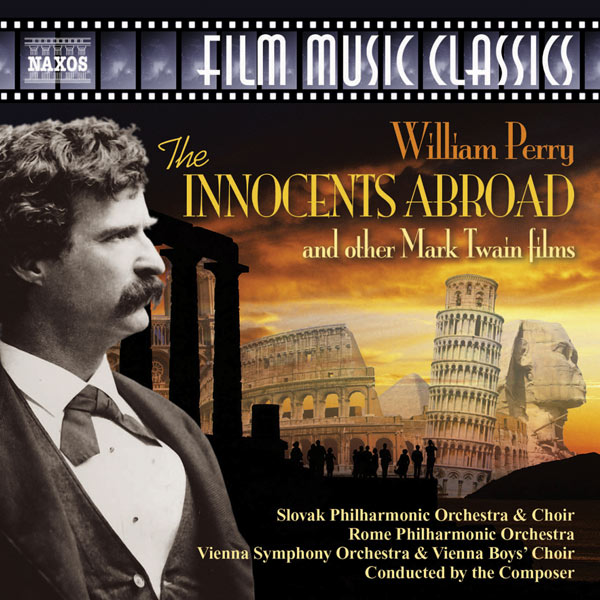
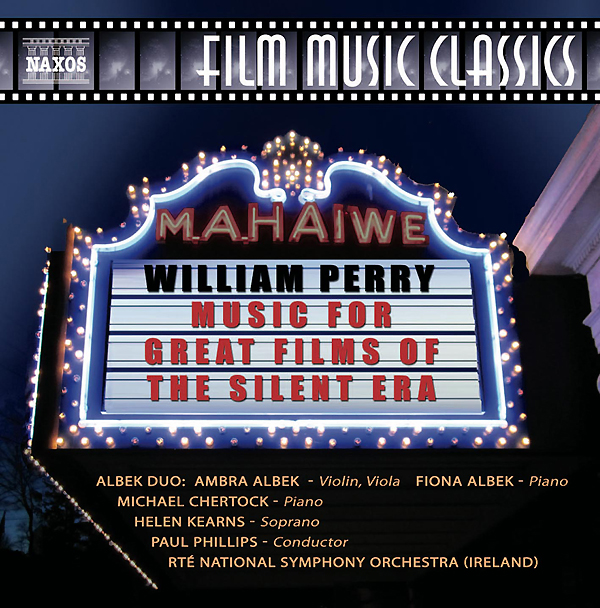
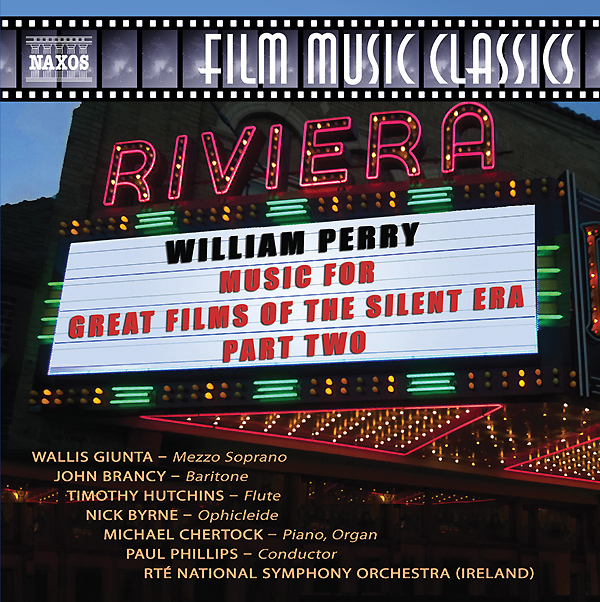
Music Composed by
William Perry
Played by the
Slovak Philharmonic Orchestra
Rome Philharmonic Orchestra
Vienna Symphony Orchestra
RT� National Symphony Orchestra of Ireland
With
Richard Hayman (harmonica)
John Brancy (baritone)
Timothy Hutchins (flute)
Nick Byrne (ophicleide)
Michael Chertock (piano/organ)
The Albek Due
Michael Chertock (piano)
Helen Kearns (soprano)
And the
Vienna Boys' Choir
Slovak Philharmonic Choir
Conducted by
Paul Phillips
William Perry
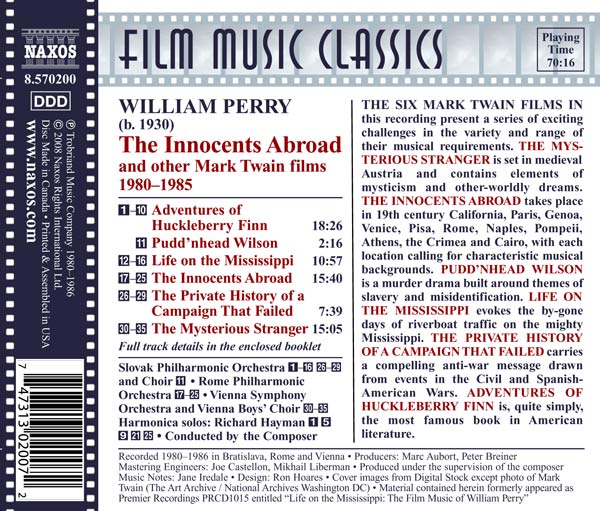
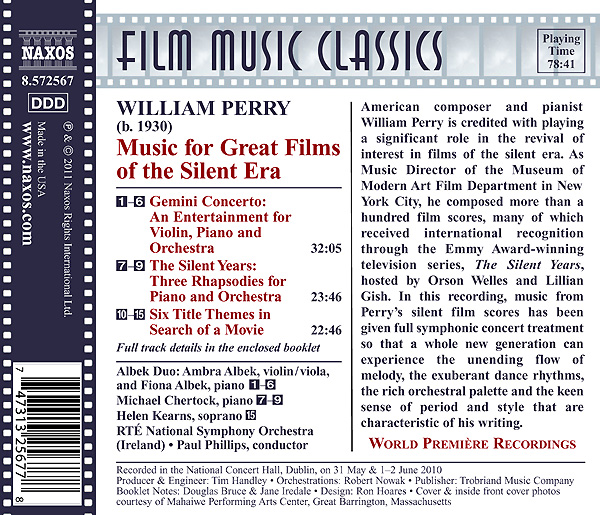
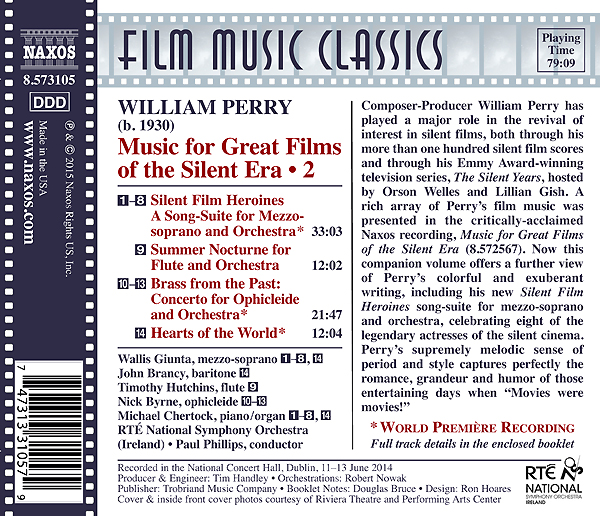
"Now aged 85, and still active as a composer, the American born, William Perry, has written more than a hundred major film scores,
many to be played with silent films. He had been a pupil of Hindemith, Piston and Thompson, though he was inclined towards light
classics including five stage musicals. �the disc opening with eight songs for mezzo-soprano and orchestra that recall the films in
which famous heroines appeared. Given a �lazy� voiced show singer, of the type that became fashionable on stage in the 1930�s, it
would be an irresistible half hour of engaging memorabilia. Perry has also enjoyed a parallel career that has seen his works performed
by the most famous American symphony orchestras, Summer Nocturne for flute and orchestra coming from that part of his musical
portfolio. A disc that he heard played on the long forgotten brass instrument, the Ophicleide, was the inspiration behind Brass from the
Past, a four-movement concerto for the instrument. Lightweight by nature, it is a pure delight, as Perry pictures it in a Blues, Military,
Pastoral and Latin American mood. Closing the disc, Hearts of the World was composed for the centenary of the First World War and
is a series of cameos he relates the passing of the war years. An international cast list is assembled featuring a young opera singer,
Wallis Giunta; the principal flute of the Montr�al Symphony Orchestra, Timothy Hutchins, and the leading trombone of the Sydney
Symphony, Nick Byrne, who has mastered the sonorous sounds of the Ophicleide. Excellent playing from The National Symphony
Orchestra of Ireland�no strangers to film music�and the sound is very good. Easy listening and highly enjoyable."
David's Review Corner
"William Perry wrote his Mark Twain film scores between 1980 and 1986, still golden years for Hollywood film music. The brilliant
orchestrations were by Richard Hayman (who also plays the harmonica in the sessions) and three other musician-arrangers, besides
the composer himself. Perry was not only a natural tunesmith, he has a feeling for the folksy American atmosphere essential for this
repertoire. He could create a memorable Hollywoodian sweep too, as in the opening music for Adventures of Huckleberry Finn,
where the ten vignettes are like a miniature suite, full of ear-tickling invention and flowing orchestral colour. But the other scores
here are hardly less inventive. In Life on the Mississippi the hero�s girl-friend Emmeline is given a charming waltz for her courtship,
and Innocents Abroad brings orchestral vignettes of Paris, Venice and Genoa. The title music of The Private History is equally ear-
catching and, to round things off, Perry employs the Vienna Boys� Choir for The Mysterious Stranger. The performances here,
by three different orchestras, conducted by the composer, could not be more persuasive, and Hayman�s harmonica interludes
add to the rustic feeling. Excellently sumptuous and vivid recording increases the pleasures of this entertaining disc."
Penguin Classical Guide (****)
"In the days of the silent cinema, pianists, and later pit bands, were recruited to provide improvised accompaniments to the
action on the screen. As a boy, Dmitri Shostakovich shivered in a Leningrad movie house as he improvised on a rickety piano
sonic enhancements beneath the silver screen to, among others, Charlie Chaplin films. According to statements Shostakovich
later made to Semyon Volkov in his controversial book Testimony , he hated the experience on the grounds that the movie
house was unheated and that the owner was in the habit of reneging on paying him. Nonetheless, some of those spiky
improvisations later made their way into his formal concert music. Who cannot listen to his First Symphony and not hear
that theater piano rattling away in its scherzo movement? Thus there is a parallel to be drawn between his and William
Perry�s careers.
I have long known William Perry (b.1930) without really knowing him. More than 20 years ago I reviewed an omnibus disc
of flute-and-orchestra pieces for Fanfare featuring flutist Keith Bryan. It contained Ibert�s and Nielsen�s flute concerti, Griffes�
Poem for Flute and Orchestra , and Perry�s Summer Nocturne . I had issues with some of the performances, but found that
brief Perry track alone worth the price of admission. As a radio host of a dinner-hour program called Divertimento , I featured
that track many times, and it always garnered favorable listener responses. Up until this moment, that was the only music
by William Perry I had ever heard. Rummaging via the Internet through the Fanfare Archive, I found a review of that disc by
Robert McColley published in 14:3, but not mine (oh well�).
Perry has long been associated with Broadway and PBS both as a producer and composer. His musical, Wind in the Willows,
was nominated for three Tony awards, and the more than 70 programs he produced for PBS have earned him, among other
awards, an Emmy. For 12 years, Perry was the music director and composer-in-residence at the Museum of Modern Art in
New York, where he composed and performed as a pianist more than 200 scores for the museum�s silent film collection.
This world premiere disc is the result of that part of his multifaceted career. By the evidence once again given here, he is a
supreme melodist with the gift for making just the right harmonic gesture at crucial moments to catapult an already
attractive tune into the affective stratosphere. His integration of popular idioms and apt quotations from other composers
is Ivesian in its scope. In sum, Perry has an uncanny ability to evoke bygone times and places with the most simple
and direct of musical gestures.
Here Perry�s piano scores have been clothed in handsome orchestrations by Robert Nowak, and sumptuously performed
and recorded by the RT� National Symphony Orchestra (Ireland) conducted by Paul Phillips. I won�t go into explicating the
pieces here. I suggest that you acquire this release post-haste, listen to it, and read Douglas Bruce�s and Jane Iredale�s
informative liner notes.
This offering is strongly recommended to all film (silent and otherwise) buffs, but even more so to those of you who
think that film music is, per se, a less than first-class musical genre."
Fanfare
Source: Naxos CDs, 2008-2015 (My rips!)
Quality: FLAC 16-44 (incl. artwork & booklets)
Please request the FLAC links (including the complete
artwork & booklets) in this thread. PMs will be ignored! These are my own rips.
Please do not share my material any further, also please
add to my reputation!
artwork & booklets) in this thread. PMs will be ignored! These are my own rips.
Please do not share my material any further, also please
add to my reputation!
American composer and producer William Perry (*1930) was born in Elmira, New York and began actively composing
and conducting at the age of fifteen. This led to musical study at Harvard University, where his teachers included Paul Hindemith,
Walter Piston and Randall Thompson. He is today best known as a film composer, but in addition to his more than one hundred
film scores and five stage musicals, Perry has been active as a composer of concert music, and his orchestral scores have been
performed by the Chicago Symphony, the Saint Louis Symphony, the Detroit Symphony, the symphony orchestras of Minnesota,
Cincinnati, Montreal and Hartford as well as the Vienna Symphony and other orchestras in Europe. Among his best-known compositions
are the Trumpet Concerto, the Jamestown Concerto for Cello and Orchestra, written to celebrate the 400th anniversary of the
first permanent colony in America (available on Naxos 8.559344) and the whimsical Six Title Themes in Search of a Movie
(Naxos 8.572567). Perry�s scores combine broad-based melodies and multi-hued harmonies with more than a hint of wit and
good humor. Dance forms, both period and contemporary, are a dominant element in the bright rhythmic structuring of his film #
and concert music.
The six Mark Twain films this recording present a series of exciting challenges in the variety and range of their musical requirements.
The Mysterious Stranger is set in medieval Austria and contains elements of mysticism and other-worldly dreams.
The Innocents Abroad takes place in 19th century California, Paris, Genoa, Venice, Pisa, Rome, Naples, Pompeii, Athens,
the Crimea and Cairo, with each location calling for characteristic musical backgrounds. Puddn'head Wilson is a murder drama
built around themes of slavery and misidentification. Life on the Mississippi evokes the by-gone days of riverboat traffic on
the mighty Mississippi. The Private History of a Campaign That Failed carries a compelling anti-war message drawn from events
in the Civil and Spanish- American Wars. The Adventures of Huckleberry Finn is, quite simply, the most famous book in American
literature.
William Perry is credited with playing a significant role in the revival of interest in films of the silent era. As Music Director of the Museum
of Modern Art Film Department in New York City, he composed more than a hundred film scores, many of which received international
recognition through the Emmy Award-winning television series, The Silent Years, hosted by Orson Welles and Lillian Gish. In this recording,
music from Perry�s silent film scores has been given full symphonic concert treatment so that a whole new generation can experience
the unending flow of melody, the exuberant dance rhythms, the rich orchestral palette and the keen sense of period and style that
are characteristic of his writing.
Now, the third album offers a further view of Perry�s colourful and exuberant writing, including his new Silent Film Heroines
song-suite for mezzo-soprano and orchestra, celebrating eight of the legendary actresses of the silent cinema. Perry�s supremely melodic
sense of period and style captures perfectly the romance, grandeur and humour of those entertaining days when �Movies were
movies!�



Music Composed by
William Perry
Played by the
Slovak Philharmonic Orchestra
Rome Philharmonic Orchestra
Vienna Symphony Orchestra
RT� National Symphony Orchestra of Ireland
With
Richard Hayman (harmonica)
John Brancy (baritone)
Timothy Hutchins (flute)
Nick Byrne (ophicleide)
Michael Chertock (piano/organ)
The Albek Due
Michael Chertock (piano)
Helen Kearns (soprano)
And the
Vienna Boys' Choir
Slovak Philharmonic Choir
Conducted by
Paul Phillips
William Perry



"Now aged 85, and still active as a composer, the American born, William Perry, has written more than a hundred major film scores,
many to be played with silent films. He had been a pupil of Hindemith, Piston and Thompson, though he was inclined towards light
classics including five stage musicals. �the disc opening with eight songs for mezzo-soprano and orchestra that recall the films in
which famous heroines appeared. Given a �lazy� voiced show singer, of the type that became fashionable on stage in the 1930�s, it
would be an irresistible half hour of engaging memorabilia. Perry has also enjoyed a parallel career that has seen his works performed
by the most famous American symphony orchestras, Summer Nocturne for flute and orchestra coming from that part of his musical
portfolio. A disc that he heard played on the long forgotten brass instrument, the Ophicleide, was the inspiration behind Brass from the
Past, a four-movement concerto for the instrument. Lightweight by nature, it is a pure delight, as Perry pictures it in a Blues, Military,
Pastoral and Latin American mood. Closing the disc, Hearts of the World was composed for the centenary of the First World War and
is a series of cameos he relates the passing of the war years. An international cast list is assembled featuring a young opera singer,
Wallis Giunta; the principal flute of the Montr�al Symphony Orchestra, Timothy Hutchins, and the leading trombone of the Sydney
Symphony, Nick Byrne, who has mastered the sonorous sounds of the Ophicleide. Excellent playing from The National Symphony
Orchestra of Ireland�no strangers to film music�and the sound is very good. Easy listening and highly enjoyable."
David's Review Corner
"William Perry wrote his Mark Twain film scores between 1980 and 1986, still golden years for Hollywood film music. The brilliant
orchestrations were by Richard Hayman (who also plays the harmonica in the sessions) and three other musician-arrangers, besides
the composer himself. Perry was not only a natural tunesmith, he has a feeling for the folksy American atmosphere essential for this
repertoire. He could create a memorable Hollywoodian sweep too, as in the opening music for Adventures of Huckleberry Finn,
where the ten vignettes are like a miniature suite, full of ear-tickling invention and flowing orchestral colour. But the other scores
here are hardly less inventive. In Life on the Mississippi the hero�s girl-friend Emmeline is given a charming waltz for her courtship,
and Innocents Abroad brings orchestral vignettes of Paris, Venice and Genoa. The title music of The Private History is equally ear-
catching and, to round things off, Perry employs the Vienna Boys� Choir for The Mysterious Stranger. The performances here,
by three different orchestras, conducted by the composer, could not be more persuasive, and Hayman�s harmonica interludes
add to the rustic feeling. Excellently sumptuous and vivid recording increases the pleasures of this entertaining disc."
Penguin Classical Guide (****)
"In the days of the silent cinema, pianists, and later pit bands, were recruited to provide improvised accompaniments to the
action on the screen. As a boy, Dmitri Shostakovich shivered in a Leningrad movie house as he improvised on a rickety piano
sonic enhancements beneath the silver screen to, among others, Charlie Chaplin films. According to statements Shostakovich
later made to Semyon Volkov in his controversial book Testimony , he hated the experience on the grounds that the movie
house was unheated and that the owner was in the habit of reneging on paying him. Nonetheless, some of those spiky
improvisations later made their way into his formal concert music. Who cannot listen to his First Symphony and not hear
that theater piano rattling away in its scherzo movement? Thus there is a parallel to be drawn between his and William
Perry�s careers.
I have long known William Perry (b.1930) without really knowing him. More than 20 years ago I reviewed an omnibus disc
of flute-and-orchestra pieces for Fanfare featuring flutist Keith Bryan. It contained Ibert�s and Nielsen�s flute concerti, Griffes�
Poem for Flute and Orchestra , and Perry�s Summer Nocturne . I had issues with some of the performances, but found that
brief Perry track alone worth the price of admission. As a radio host of a dinner-hour program called Divertimento , I featured
that track many times, and it always garnered favorable listener responses. Up until this moment, that was the only music
by William Perry I had ever heard. Rummaging via the Internet through the Fanfare Archive, I found a review of that disc by
Robert McColley published in 14:3, but not mine (oh well�).
Perry has long been associated with Broadway and PBS both as a producer and composer. His musical, Wind in the Willows,
was nominated for three Tony awards, and the more than 70 programs he produced for PBS have earned him, among other
awards, an Emmy. For 12 years, Perry was the music director and composer-in-residence at the Museum of Modern Art in
New York, where he composed and performed as a pianist more than 200 scores for the museum�s silent film collection.
This world premiere disc is the result of that part of his multifaceted career. By the evidence once again given here, he is a
supreme melodist with the gift for making just the right harmonic gesture at crucial moments to catapult an already
attractive tune into the affective stratosphere. His integration of popular idioms and apt quotations from other composers
is Ivesian in its scope. In sum, Perry has an uncanny ability to evoke bygone times and places with the most simple
and direct of musical gestures.
Here Perry�s piano scores have been clothed in handsome orchestrations by Robert Nowak, and sumptuously performed
and recorded by the RT� National Symphony Orchestra (Ireland) conducted by Paul Phillips. I won�t go into explicating the
pieces here. I suggest that you acquire this release post-haste, listen to it, and read Douglas Bruce�s and Jane Iredale�s
informative liner notes.
This offering is strongly recommended to all film (silent and otherwise) buffs, but even more so to those of you who
think that film music is, per se, a less than first-class musical genre."
Fanfare
Source: Naxos CDs, 2008-2015 (My rips!)
Quality: FLAC 16-44 (incl. artwork & booklets)
Please request the FLAC links (including the complete
artwork & booklets) in this thread. PMs will be ignored! These are my own rips.
Please do not share my material any further, also please
add to my reputation!